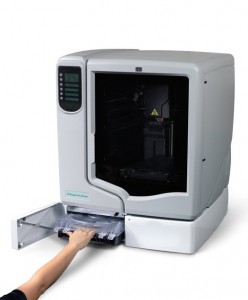I attended a two-day symposium at Arizona State University this past September, where technologists came together to discuss trends in microelectronic packaging. It was specifically geared toward medical electronics, but the presentations spanned a wide range of applications.
Most people don’t know or care how their iPhone manages to pack so much functionality into such a small volume, nor how a thousand songs can emanate from a bauble that weighs less than their keychain, but each of these now commonplace items is made possible by two key trends:
- The continued pace of shrinking microelectronics (Moore’s Law)
- The ability to pack those tiny transistors into smaller and smaller volumes (More than Moore)
- A company (mc10) that is taking regular computer chips, making them so thin that the silicon material from which they’re made is as flexible as paper, and then mounting them on plastic so they become flexible and stretchable.
- A technology that brings physical prototyping to the desktop. This capability has been around for several years, but the cost has come down to the point where you can set up shop in your garage or home office. With the use of two different plastics, one of which is dissolvable in water, completely functional designs with moving gears and levers can be created in a single pass. A desktop version is shown below.
Desktop Prototyping System by Stratasys
Although our ability to make transistors smaller and smaller is approaching a wall, based more upon economics than physics, people will continue to find creative ways to use new materials and techniques. I am intrigued by where things might go as electronics and biotechnology merge; perhaps we’ll see a day when flexible electronics can be integrated with desktop bio-prototyping to build individualized therapeutic devices, based upon our DNA. I know I could use a new set of eyes. I’d love to toss my glasses, or enhance my eyesight to include the ability to automatically zoom in on distant objects.

